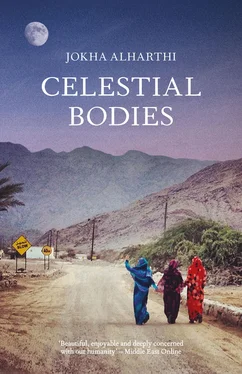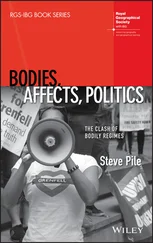Zarifa squats on the ground and her enormous breasts spill onto her lap as her plump fingers, heavy with silver rings, undo the taping around the little cartons of finest-quality Omani jelly-sweet. She taps the almond garnish and dark brown surface lightly, and it quivers. Just have a look at that sweet sight! All this goodness, then they say to me, Don’t eat it, remember your diabetes, it’s all sugar, leave it. Well, sugar or no sugar, sorry, Zarruuf doesn’t leave sweets alone. All sugar, they’ll grumble, well, hah! Zarifa picks up a large chunk and crams it into her mouth with all her fingers, and makes a point of licking them, as if now, at this moment, she’s getting her sweet revenge for those many years of hunger she knew in the household of Shaykh Said, before my father bought her.
Hide me away in your soft warm chest, Zarifa — I am frightened. Hold my head, rest it somewhere between your lap and your breasts. Let me breathe in your sweat and the smell of broth you always carry, and then, let me sleep. I am afraid, Zarifa. My father won’t forgive me for your death. My father will never relent, and I am afraid of what he will do. He’s come out of his grave, again and again, to question me about you. He tied me up with that palm-fibre rope, do you remember, and he threw me upside down into the well.
From the bottom of the well, I shouted. She died a peaceful death, the Lord took her away, long after your time. You’d already been dead for years.
But he did not raise me out of the well.
He left me there, head down in the pitch-black well shaft.
As God is great, Father, I did not even know! I’d moved to Muscat by then and the business consumed every moment. I only went back to al-Awafi for feast days. I heard she’d come back from Kuwait. They said she couldn’t stand living with Shanna. Somebody said Shanna threw her out of the house, and somebody else claimed she tried to get Zarifa locked up as a madwoman, so Zarifa fled. Still others said that Zarifa just missed al-Awafi too much and couldn’t endure being away. That she saw her mother Ankabuta in a dream, calling her, so she came back. She moved in with relatives.
Father, I was so busy. It was just after the stock market collapsed, and Abu Salih and I were trying desperately to build up our business. Father, I was so busy, all of the time. I was in Muscat, and I was in al-Khuwayr, al-Ghubra, I was in al-Hayl, Sib, I was in every single town and area anywhere near Muscat, I was searching for a bit of land, a house, a villa, contractors, a clinic that could help us with Muhammad’s autism, English-language institutes, accounting classes, a car bigger than your old white Mercedes, any good deals, a decent travel agent, reliable domestic servants — Philippinas, Indonesians — schools for the children, tutors, a driver, places to spend the evening, friends...
My father did not lift me out of the well.
Pull, Father! Haul up the rope. Tug hard on the end you are holding until the other end tightens around my waist enough that I come up. The well is dark, Father, and snakes live in here. Lift me out, I won’t steal your rifle, I won’t go off with Marhun and Sanjar, anyway, Sanjar is working as a porter in the souk now, Father, and Shanna works as a school janitor. Zarifa is the one who left, she left them, she couldn’t stand life in Kuwait.
Get me out of this well, Father. I won’t be longing for those magpies and I won’t play ball with the boys. I won’t stay up late listening to the bewitching melodies of Suwayd’s oud, I won’t scream into your face, and you in a coma, that Sanjar ran away just like his father, Habib, and that I’m the only one who didn’t run away. Raise me out of here, I won’t leave Zarifa, your beloved, your mother, your daughter, your slave, your lady. I won’t leave her to die alone in some forgotten hospital.
The diabetes got worse, Father, it was terrible. Do you know what it means, the sukkari? It went through her whole body, it was horrible, and they amputated her leg. Her relatives said, We aren’t going to keep supporting a crippled woman. Then they cut off her other leg and the neighbours said, Who is going to take her to the bathhouse? Who is going to drag this enormous body with no legs over there? The hospital director was kind. He let her stay in there for good, and the nurses took care of her.
Hoist me up, Father.
Zarifa, bring me up from this well.
I’m afraid.
I am so, so afraid.
Azzan brought her close. Najiya! My Fullest Moon, I want you, mine.
I am yours, Najiya whispered. Already.
He moaned. No, not completely. Others are always other.
She slipped out of his grip. What do you mean?
I mean, people are always apart, Najiya, they’re separate in the end, even when they think they’re one. It’s the harshest kind of aloneness there is.
She gave him a disapproving look and at that, he grinned. Do you remember Ibn al-Rumi?
Now Najiya smiled. The pessimist? Yes, of course.
He hugged her close again. Do you know what he says?
Though I hold her close, my soul still yearns
yet how can I be closer than in her embrace?
I kiss her mouth to chase my fever away
but my mad cast-off love-thirst burns ever more
The reach of my passion! May that craving be cured
by the sweetness of that which my lips do absorb
My exposed weathered heart will never heal itself
until these two selves are seen as one mingled
At the same instant the two of them sighed.
Those poets who sang about the pleasure of possession weren’t lovers, he said flatly. They were hunters.
Najiya’s smile turned lightly sarcastic. Hunters?
Yes, that’s right, Azzan said firmly. A lover, Najiya, doesn’t possess the beloved, however much pleasure the lover feels, and however close to the beloved. A true beloved is like you — someone who can’t be owned.
Najiya looked uneasy. She’d never known how to hide her feelings, and it made her especially uncomfortable that Azzan was spoiling their togetherness with words like these. Why did he have to start talking about ownership? He was the one who had a family, children — and she wasn’t demanding anything of him. She was perfectly happy like this. It didn’t occur to her to think about things like ‘possession’ and ‘hunting’. Her desire was to be his lover and she was, and she didn’t want anything else. Why did he always appear so tortured by cryptic feelings that she couldn’t grasp?
Asma planted herself in front of the mirror, imitating Khawla. The figure she stared at was a young woman of middling height, barely twenty years old, with wide brown eyes and a short nose. Her eyelashes felt heavy — all those layers of mascara — and the red lipstick she thought made her face look like a clown’s. She glanced quickly over her body, squeezed into the wedding gown picked out by the two mothers together, its glossy, glittery, form-fitting dishdasha with its generous embroidery at the throat and down the long sleeves, as well as the length of the train. Traces of the indeterminate anxiety she’d felt earlier returned. She tried to distract herself by studying the elaborate henna designs that scrolled along the back of her hands and around onto the palms. She glanced into the mirror again and smiled nervously at the sight of her bosom, so high and prominent under the close-fitting gown. She remembered how frightened she had been, a few years ago, when the first visible traces of femininity had taken her by surprise. She had loathed seeing the derisory swelling on her chest and every evening she prayed that by morning it would be gone. Then, and for the next few months, she submitted to her sister Mayya’s advice on how to hide this new protuberance. On that evening as she listened to Asma crying at the falaj where they were washing clothes as it grew dark, Mayya said, Don’t be so scared, Asma. It’s just a new fatty bulge. If you give it a good rub with some salt dissolved in warm water it will melt away. If it’s really stubborn like mine was, I’ll take in all your undershirts, they’ll push it all back and no one will see any of it. But, wearing her altered undershirts, sometimes Asma couldn’t breathe because they were so tight. And all the salt did was to make her small chest peel, and it kept on growing anyway, until her mother ordered her to start wearing a head wrap. She taught Asma how to wrap it around her head and neck leaving some fabric so that it would cover her chest too. Once again she could breathe freely, and she stopped saying those special, pleading nightly prayers.
Читать дальше












